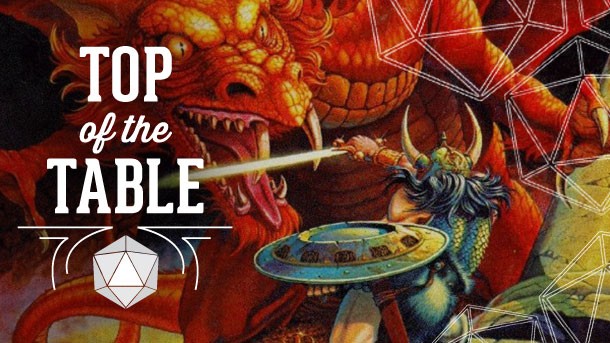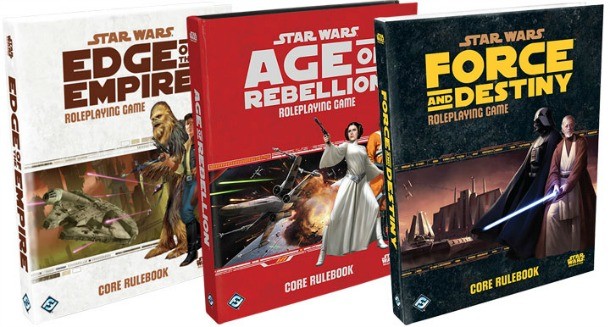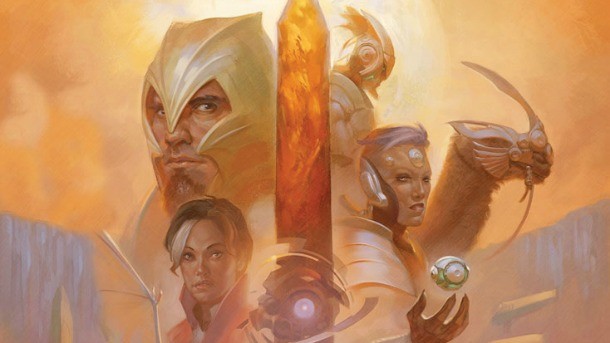Our extra-large special edition is here. Subscribe today and receive the 25% longer issue at no extra cost!
Top Of The Table – So You Want To Be A Dungeon Master?

I’ve made some of my closest friends sitting around a table playing role-playing games like Dungeons & Dragons. The experience of a shared narrative leads to tons of laughs and fun memories. But if you’ve never tried to run a role-playing game, the whole process can feel intimidating.
I’ve received numerous emails over the years from prospective DMs who want to start playing, and are looking for some suggestions on how to get started. As I told those enthusiasts, while there’s no catch-all advice that is going to be perfect for everyone, there are some guidelines that should point you in the right direction.
We’re going to divert a few times in the coming months from the regular schedule of individual board, card, and role-playing games, and discuss some of the ins and outs of running your own RPG game for your friends. It’s a surprisingly big and complex topic, but we’re starting today with some basics – what to play, how to think about your players, and what to prioritize as you prepare to sit down for your first adventure. A lot of the strategies for the actual running of a game are going to be in a future installment. We’ve got to start somewhere, and if you’re serious about running an RPG, the first lesson is that prep before sitting down at the table is as important as the actual game. If you want to jump ahead to running a session, check out Part 2.
What Should I Play?
I used the term “dungeon master” in the headline of this column because it’s the word most people connect to the concept. Dave Arneson and Gary Gygax originally released D&D in the early 1970s, and those early adventures were predominantly concerned with crawling through underground dungeon complexes, so the person running the game had an obvious moniker. But in the years since, numerous terms have been applied, depending on the game – game master, narrator, storyteller – each meant to imply a slightly different focus for the person directing the flow of the story and action.
Your choice of game (and the relevant title you take on as the person running the game) is your first big decision. The landscape of modern role-playing games is vast, with all sorts of games that cater to different fantasies and styles of play.
If you and your friends want the “classic” RPG experience, I recommend one of the two dominant games in the field – the latest (5th) edition of Dungeons & Dragons, or its cousin, the Pathfinder Role-Playing Game. While RPG faithful can spend hours debating the merits of each, I’m here to tell you that they’re both excellent game systems, with robust rules to cover any classic fantasy adventure you’d like to explore. Equally important, they both have active and engaged player bases, ongoing support from their respective publishers, and time-tested rules that hold up to whatever situation you throw at them.
Looking for something with a more futuristic slant? The latest edition of the Shadowrun ruleset is awesome, melding traditional fantasy concepts like elves and dragons with a cyberpunk sci-fi aesthetic. If the weighty rules of that system don’t appeal, you can still explore the setting with the recent and excellent Shadowrun Anarchy system, which maintains the setting but opts for a greater focus on storytelling. For a universe that virtually every one of your players is guaranteed to love, I’m also a big fan of Fantasy Flight’s series of Star Wars RPGs, which use a compelling narrative dice mechanic to drive action that feels like it’s right out of the movies. And my personal favorite RPG and setting of recent years also deserves a mention; Monte Cook Games’ Numenera is a brilliant experience set on Earth a billion years in the future, and it doubles as one of the most accessible introductions to RPGs I have encountered.
Are your buddies more into the horror scene? Plenty of great options exist. Consider the most recent edition of the Call of Cthulhu RPG, or the phenomenally strange Delta Green, both of which focus on investigations and existential terror rather than sword fights and dragons. You may also want to consider one of the World of Darkness series of RPGs; these storytelling-focused Gothic adventures focus on classic monsters; you can find active communities for both the classic World of Darkness RPGs like Vampire: The Masquerade and the newer Chronicles of Darkness games. And for a real change of pace, check out the wildly fun Dread RPG, a game where the primary mechanic involves pulling a block from a Jenga tower to see if the characters survive the horrors before them.
If you’d like a rules system that is more flexible to any style of setting, consider checking out one of the universal role-playing systems, like Fate Core System, Savage Worlds, or the Cypher System, all of which have smartly structured systems that can adapt well to even the most unusual potential settings. These games often sacrifice specificity of rules for flexibility, and offer specific optional setting books that help a game master drill down into the concept they want.
And are you planning to run a game for the kids in your life? You may want to check out my suggestions for RPGs to play with younger players.

The recent Star Wars RPGs let you choose which aspect and tone of the Star Wars universe to focus on
Understand Your Role
You are not the player’s enemy. The popular culture that surrounds D&D has magnified this core misunderstanding, so let’s wipe that out right away. Should you challenge your players? Yes! Should you throw them narrative curve-balls? Yes! Should you act out truly dastardly evil for them to confront? Absolutely, yes! And should the player characters lose sometimes? For sure!
Even given all of that, your role isn’t to oppose your players – it’s to facilitate their fun. Every DM has a different approach to challenge, not unlike every video game. Your job is to figure out what your players get excited about, combine it with what excites you as a narrator and storyteller, and then pull it all together into a coherent whole. Sometimes that adds up to frequent character death and oppressive difficulty, while other times you’re enacting a superhero fantasy where the characters triumph over their enemies time and again. Usually it’s somewhere in between.
Another fundamental misunderstanding for beginning DMs deals with the difference between writing a story and prepping a game. As the person at the table who is guiding the narrative, the temptation is often to take over everything and just tell your players a story about what their characters are seeing and doing. If they wanted that, they would go read a book or watch a TV show or movie. They’re sitting at the table because they want an interactive narrative that they can shape – it’s the one thing that tabletop RPGs do better than any other entertainment medium, so don’t lose touch with it.
This might sound counter-intuitive, but consider for a moment your favorite comic book or action movie. Is the protagonist swept along through scenes they have no control over? Or is it their decisions and choices that shape the story? The same should be true in your role-playing adventures – your players are the central protagonists, so they need to drive the action. In your preparations prior to the game, set up intriguing situations. Create compelling non-player characters to inhabit the space. And offer hooks into adventure and danger that are so irresistible players feel compelled to follow them. But let the players make those calls themselves, and follow where they lead. This is a topic we’ll talk a lot more about in future installments when we’re addressing the actual running of a session.
Finally, the dirty secret of DMing: Nothing is true until it appears in the game. Did your carefully orchestrated assault by 20 goblins get missed because the players decided to travel via boat instead of through the canyon? Maybe the goblins have been waiting at the river the whole time. Prepare interesting content in your notes before a session, but be willing to repurpose that content where needed to make for the most fun. At the same time, don’t overuse the technique; players can tell when you’re railroading them into content that was unavoidable. Sometimes it’s better to leave a carefully orchestrated encounter unplayed and give players the feeling that they’ve outwitted their foes.
Learn the Rules So You Can Ignore the Rules
Individual players of a role-playing game can often get away with not learning the rules ahead of time, but that’s not really the case if you plan to run the game as its game master. Before you ever start trying to convince your friends to sit down at the table, make sure you have a grasp on the game you’re trying to play. Take the time to read the games rules and (where applicable) its setting.
Contrary to what you might expect, reading through a well-written game and setting can be a lot of fun, especially if you’re the kind of person who likes to understand the concepts behind game design and narrative (which you probably are if you’re thinking about being a DM). Especially as you get more familiar with different games and universes, it can be fascinating to see the way different creators have crafted their fiction and mechanics, and compare it with what you already know.
Ultimately, the time you spend learning a game before you run it pays dividends, and it also helps you discover what parts of the game you like and don’t like, so you know where to put your focus. Don’t like character encumbrance rules? Leave them out. Prefer a more relaxed approach to modifiers on weapon range die rolls? Forget the modifiers. In my experience, new DMs struggle a lot with the idea of running the game “correctly,” when the focus should really be on running a game that is fun. If you don’t know a rule, it’s usually far better to keep the story going than to get bogged down in looking up the way it’s supposed to work. Make a call, and keep the action moving. But until you at least have a grasp on the rules system you’re playing in, it’s hard to know what is worth ignoring, and what other aspects are key to the game’s appeal.
Next Page: Understand who you're playing with, and prepare for anything

The Numenera RPG is richly imagined, melding science fiction and fantasy in a far-future setting
Know Your Players
While you might sometimes find yourself with players you don’t know (such as convention play), most first-time DMs will be running games for their close friends. Take advantage of that fact.
Your job as the DM is to help your players have a fun time. If you were making them dinner, you’d probably ask them what they like to eat. The same is true for a role-playing game. Even without asking any questions, you probably know things about your players that could help to shape the game you run for them. Your friend who can’t stop talking about Game of Thrones likely enjoys some intrigue in his games. Your buddy who was the star of every high school play likely enjoys the chance to really get into an acting role. Your wife or husband who only likes playing stylish-action video games probably desires a chance for some high-octane combat.
Often, your best clue to what a player wants comes from the kind of character they make. As a rule, I set aside my first RPG get-together with a new group to hang out, talk about the game, and create characters as a group. The extra time investment pays off. Players talk with each other about how their characters are connected. They ask questions about how to make their character be “like a ninja” or “like a space marine.” This kind of info is invaluable as you prepare your first adventure.
The best role-playing experiences meld the story the DM is trying to tell with the personal narratives of the players and their characters. Consider the characters that each player is bringing to the game, and try to design opportunities to let each of those characters shine and show off what makes them cool.
Plan Small First, But Be Prepared for Anything
DMs often overestimate how much content they need to prepare for a given scenario or adventure. Whether you use a published module adventure (recommended for your first time) or you’re crafting your own adventure from scratch (a concept that deserves an entire separate installment of this column), the reality is that a given session of play often involves just a few major encounters, conversations, and activities. Make those situations shine with detail and nuance.
What does that mean for your preparation time before the game begins? Focus your prep time around things you have control over. Whether it’s a published module or your own creation, you need to have a good sense of the most likely scenarios that the players are going to encounter. If players are likely to enter a particular town, make sure you have some interesting NPCs to populate the hamlet. If there are five paths through the haunted forest, but the whole forest is populated by skeletal knights from a forgotten civilization, then make sure you have the stats for those skeletons handy.
And don’t spend endless prep time on the tenth encounter when it’s likely your players won’t get past encounter three in this first session. Polish up your understanding of the encounters and situations that the players are almost sure to run into at the beginning of the session, and then split your remaining prep time on what might happen after that.
Despite your most fervent prep work for individual encounters, your players inevitably foil your expectations. It is simply part of the job description. While most DMs aren’t above some gentle nudging to put a player character party back on track, sometimes you’re just going to have to deal with the unexpected. That means you’re going to have to shoot from the hip from time to time, and craft the narrative to move down a path you never expected. Don’t get frustrated! That’s the magic of role-playing games, and you should embrace it. If the players desire to guide the direction of the story, try to see where they’re going with it, and then focus prep for your next session on providing more of what your players seemed to be looking for. Be creative, flexible, and willing to make some mistakes along the way – most players will appreciate an enthusiastic partner in storytelling far more than a disgruntled DM who is disappointed that he didn’t get his or her own way.

Shadowrun: Anarchy offers the deep Shadowrun universe, but story-focused rules ideal for newcomers
What Exactly Do You Mean By Prep?
Before closing out, it bears a quick conversation on the specifics of what I mean by pre-game prep. Experienced DMs know the joy (and terror) of running a game fresh without any time to do setup ahead of time. We all get busy! But for your first time as a DM, that’s a terrible idea.
Every DM has a different approach to setting up their sessions. Some focus on setting up grid maps and area descriptions. Others jot important dialogue elements down. Most take some notes on monster and NPC stats in a notebook or computer, in advance of having to run an encounter. If playing with minis, a DM might pre-pull the appropriate figures and set up the potential battlefield. And if you’re using a pre-published adventure, it’s essential to both read through the content ahead of time, and make some notes about how you might want to adapt the content to fit your group.
Any way you cut it, being the DM is a lot of work, especially if you want to do it well. If I really want a session to shine, I will spend as much time prepping an evening of gaming as I will on actually playing at the table with my friends. I’ve been doing this for a lot of years, and so I buy a new paper notebook for each campaign I’m going to run, and label pages for each session. I use a formal outline structure to recall my planned encounters and keep me on track, while simultaneously setting aside other pages to put down some notes for unexpected situations that might arise. And sometimes, especially after a busy week, I throw it all out the window and come up with a session on the fly. Suffice to say, everyone is different, and most people vary and evolve their approach all the time.
Until you do it, it’s hard to explain how rewarding the entire process can be. Without getting too philosophical, I think about my time running sessions for my friends as a gift I can share with them. The shared laughter, tension, and smiles afterward not only give you the sense of having done something creative, but that you did that creative thing to benefit your players. And trust me, they’ll appreciate it. Like hosting a great party, a fun night of gaming together can be something you recall and talk about in the years to come. People remember the characters and situations that unfolded. After one particularly memorable two-year campaign together, my friends even commissioned an art piece from a local artist, depicting the adventuring party of characters we had followed for so many months, which hangs on my wall to this day.
Top of the Table will be back to highlight some individual board, card, and role-playing games in a few weeks, but I’m hopeful that the tips above can inspire some folks to start planning for a role-playing game with their friends. In order to find your game of choice, read the rules and setting, start making characters with your players, and work to prep your first session, it may be several weeks before you’re ready to actually play your first full game session. By then, I hope to have some advice for the other half of the equation – the ins and outs of running an evening of RPG adventure.
If you want some other tabletop game recommendations in the meantime, I hope you’ll click on the Top of the Table banner below to visit our hub, where you can uncover all sorts of great games to play with friends and family. And if you simply want some additional advice on getting your own home role-playing game up and running, I hope you’ll contact me by email or Twitter. I’m happy to share some additional suggestions, or offer additional setting and game recommendations if none of the above sound quite right.


Get the Game Informer Print Edition!
Explore your favorite games in premium print format, delivered to your door.
- 10 issues per year
- Only $4.80 per issue
- Full digital magazine archive access
- Since 1991









